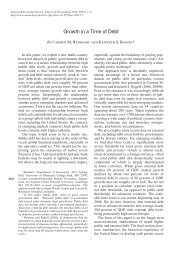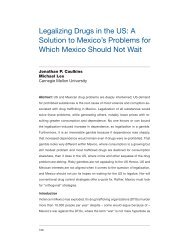The collapse of global trade, murky protectionism, and the crisis:
The collapse of global trade, murky protectionism, and the crisis:
The collapse of global trade, murky protectionism, and the crisis:
You also want an ePaper? Increase the reach of your titles
YUMPU automatically turns print PDFs into web optimized ePapers that Google loves.
VOX<br />
Research-based policy analysis <strong>and</strong> commentary from leading economists<br />
firms with <strong>and</strong> without strings attached. Some <strong>of</strong> <strong>the</strong> conditions relate to production<br />
<strong>and</strong> employment levels, operations <strong>of</strong> foreign subsidiaries, <strong>and</strong> executive compensation.<br />
In <strong>the</strong> automobile sector it has been reported recently that Italy <strong>and</strong> Spain plan<br />
on joining France in conditioning financial support on commitments to retain<br />
domestic employment levels. Italy is also said to have dem<strong>and</strong>ed that its financial<br />
support to car producers be used to pay suppliers on time. 21<br />
O<strong>the</strong>r subsidies have related to <strong>the</strong> financing <strong>of</strong> firms 22 , including loan guarantees,<br />
access to below-market rates <strong>of</strong> interest, <strong>and</strong> lenient default policies. Yet ano<strong>the</strong>r<br />
important form <strong>of</strong> subsidy relates to wages <strong>and</strong> employment. Germany, for example,<br />
subsidises <strong>the</strong> wages <strong>of</strong> over a quarter <strong>of</strong> a million workers that <strong>the</strong> <strong>crisis</strong> prevents<br />
working full time. Finally, stimulus packages have included taxation <strong>and</strong> expenditure<br />
provisions <strong>of</strong> particular interest to a given sector.<br />
<strong>The</strong> harm done by subsidies at home <strong>and</strong> abroad<br />
What makes bailouts such a useful vehicle for <strong>murky</strong> <strong>protectionism</strong> is that <strong>the</strong>re are<br />
circumstances under which certain subsidies can improve national economic performance<br />
<strong>and</strong> resource allocation. Blanket condemnation <strong>of</strong> subsidies is, <strong>the</strong>refore,<br />
inappropriate. Much turns on how <strong>the</strong> discretion given to public <strong>of</strong>ficials in designing<br />
bailouts is employed <strong>and</strong> whe<strong>the</strong>r in fact <strong>the</strong> principles for <strong>the</strong> design <strong>of</strong> effective<br />
subsidies (that economists have articulated over <strong>the</strong> years) have been employed during<br />
this <strong>crisis</strong>. <strong>The</strong> strong combination <strong>of</strong> private interests <strong>and</strong> political imperatives<br />
can ride roughshod over <strong>the</strong> proper design <strong>of</strong> bailouts <strong>and</strong>, without much information<br />
in <strong>the</strong> public domain, <strong>the</strong> beneficiaries can still claim those principles were<br />
applied.<br />
Subsidies can have three types <strong>of</strong> welfare-reducing effects. First, <strong>the</strong>y can distort <strong>the</strong><br />
recipient firm's incentives. When firms expect to receive a subsidy in case <strong>of</strong> bad outcomes,<br />
<strong>the</strong>y are less likely to bear <strong>the</strong> cost necessary to avoid sub-st<strong>and</strong>ard performance.<br />
Likewise, <strong>the</strong>ir incentive to restructure <strong>and</strong> become more efficient diminishes.<br />
<strong>The</strong> mere expectation <strong>of</strong> a bailout can adversely hit cost competitiveness <strong>and</strong> productivity<br />
growth.<br />
Second, when some firms are subsidised <strong>and</strong> o<strong>the</strong>r firms in <strong>the</strong> same market are<br />
not, <strong>the</strong> subsidised firms benefit from an artificial advantage. Competition is no<br />
longer solely "on <strong>the</strong> merits" (good products or services, low costs, etc) <strong>and</strong> more efficient<br />
competitors may contract <strong>and</strong>, in <strong>the</strong> limit, leave <strong>the</strong> industry. Firms can also<br />
use <strong>the</strong> subsidies that <strong>the</strong>y receive to engage in anticompetitive practices, such as<br />
predatory pricing <strong>and</strong> to fund competition-reducing acquisitions.<br />
A third problem with many subsidies is that <strong>the</strong>y only indirectly affect <strong>the</strong> ultimate<br />
objective set by <strong>the</strong> government. If job loss is <strong>the</strong> state's real concern, <strong>the</strong>n subsidies<br />
to production costs or reduced cost <strong>of</strong> credit will only influence employment decisions<br />
through <strong>the</strong>ir impact on o<strong>the</strong>r aspects <strong>of</strong> firm performance. <strong>The</strong> best subsidy is<br />
<strong>the</strong> one that targets precisely <strong>the</strong> private sector decision in question (employment in<br />
21 See "EU <strong>and</strong> France ease <strong>protectionism</strong> row on summit eve," Agence France Press, 28 February 2009.<br />
22 For example, <strong>the</strong> UK government is reported to have asked beneficiaries <strong>of</strong> its Asset Protection<br />
Scheme for banks to "pledge" to lend more to UK mortgage holders <strong>and</strong> small <strong>and</strong> medium-sized businesses.<br />
See "<strong>The</strong> biggest insurance policy in history," <strong>The</strong> Independent, 25 February 2009. Similarly,<br />
<strong>the</strong> Australian government is said to be creating a A$4 billion fund to assist investors in commercial<br />
property that cannot refinance foreign debts when <strong>the</strong>y come due; see "Homeward Bound," <strong>The</strong><br />
Economist, 7 February 2009.<br />
82





